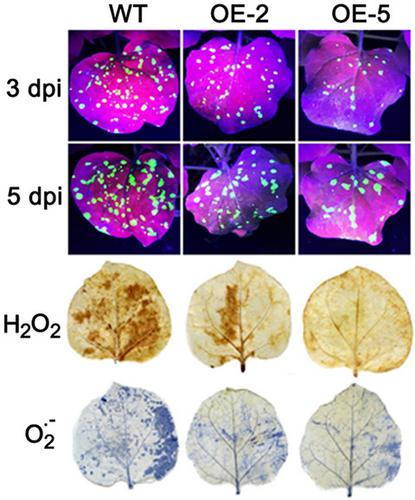当前位置:
X-MOL 学术
›
Mol. Plant Pathol.
›
论文详情
Our official English website, www.x-mol.net, welcomes your
feedback! (Note: you will need to create a separate account there.)
Alpha-momorcharin enhances Nicotiana benthamiana resistance to tobacco mosaic virus infection through modulation of reactive oxygen species.
Molecular Plant Pathology ( IF 4.8 ) Pub Date : 2020-07-26 , DOI: 10.1111/mpp.12974 Feng Zhu 1 , Peng-Xiang Zhu 1 , Fei Xu 2 , Yan-Ping Che 1 , Yi-Ming Ma 1 , Zhao-Lin Ji 1
Molecular Plant Pathology ( IF 4.8 ) Pub Date : 2020-07-26 , DOI: 10.1111/mpp.12974 Feng Zhu 1 , Peng-Xiang Zhu 1 , Fei Xu 2 , Yan-Ping Che 1 , Yi-Ming Ma 1 , Zhao-Lin Ji 1
Affiliation

|
Alpha‐momorcharin (α‐MMC), a member of the plant ribosomal inactivating proteins (RIPs) family, has been proven to exhibit important biological properties in animals, including antiviral, antimicrobial, and antitumour activities. However, the mechanism by which α‐MMC increases plant resistance to viral infections remains unclear. To study the effect of α‐MMC on plant viral defence and how α‐MMC increases plant resistance to viruses, recombinant DNA and transgenic technologies were employed to investigate the role of α‐MMC in Nicotiana benthamiana resistance to tobacco mosaic virus (TMV) infection. Treatment with α‐MMC produced through DNA recombinant technology or overexpression of α‐MMC mediated by transgenic technology alleviated TMV‐induced oxidative damage and reduced the accumulation of reactive oxygen species (ROS) during TMV‐green fluorescent protein infection of N. benthamiana. There was a significant decrease in TMV replication in the upper leaves following local α‐MMC treatment and in α‐MMC‐overexpressing plants relative to control plants. These results suggest that application or overexpression of α‐MMC in N. benthamiana increases resistance to TMV infection. Finally, our results showed that overexpression of α‐MMC up‐regulated the expression of ROS scavenging‐related genes. α‐MMC confers resistance to TMV infection by means of modulating ROS homeostasis through controlling the expression of antioxidant enzyme‐encoding genes. Overall, our study revealed a new crosstalk mechanism between α‐MMC and ROS during resistance to viral infection and provides a framework to understand the molecular mechanisms of α‐MMC in plant defence against viral pathogens.
中文翻译:

α-momorcharin 通过调节活性氧来增强本塞姆氏烟草对烟草花叶病毒感染的抵抗力。
α-苦瓜素 (α-MMC) 是植物核糖体失活蛋白 (RIP) 家族的成员,已被证明在动物中表现出重要的生物学特性,包括抗病毒、抗菌和抗肿瘤活性。然而,α-MMC 增强植物对病毒感染的抵抗力的机制仍不清楚。为了研究α-MMC对植物病毒防御的影响以及α-MMC如何提高植物对病毒的抵抗力,采用重组DNA和转基因技术研究α-MMC在本塞姆氏烟草抵抗烟草花叶病毒(TMV)感染中的作用。通过DNA重组技术产生的α-MMC或转基因技术介导的α-MMC过度表达的治疗减轻了TMV诱导的氧化损伤,并减少了TMV绿色荧光蛋白感染本塞姆氏烟草期间活性氧(ROS)的积累。与对照植物相比,局部 α-MMC 处理后以及α-MMC过表达植物中上部叶的 TMV 复制显着减少。这些结果表明,在本塞姆氏烟草中应用或过度表达 α-MMC 会增加对 TMV 感染的抵抗力。最后,我们的结果表明,α-MMC 的过度表达上调了 ROS 清除相关基因的表达。 α-MMC 通过控制抗氧化酶编码基因的表达来调节 ROS 稳态,从而赋予对 TMV 感染的抵抗力。总的来说,我们的研究揭示了α-MMC和ROS在抵抗病毒感染过程中的新串扰机制,并为理解α-MMC在植物防御病毒病原体中的分子机制提供了一个框架。
更新日期:2020-07-26
中文翻译:

α-momorcharin 通过调节活性氧来增强本塞姆氏烟草对烟草花叶病毒感染的抵抗力。
α-苦瓜素 (α-MMC) 是植物核糖体失活蛋白 (RIP) 家族的成员,已被证明在动物中表现出重要的生物学特性,包括抗病毒、抗菌和抗肿瘤活性。然而,α-MMC 增强植物对病毒感染的抵抗力的机制仍不清楚。为了研究α-MMC对植物病毒防御的影响以及α-MMC如何提高植物对病毒的抵抗力,采用重组DNA和转基因技术研究α-MMC在本塞姆氏烟草抵抗烟草花叶病毒(TMV)感染中的作用。通过DNA重组技术产生的α-MMC或转基因技术介导的α-MMC过度表达的治疗减轻了TMV诱导的氧化损伤,并减少了TMV绿色荧光蛋白感染本塞姆氏烟草期间活性氧(ROS)的积累。与对照植物相比,局部 α-MMC 处理后以及α-MMC过表达植物中上部叶的 TMV 复制显着减少。这些结果表明,在本塞姆氏烟草中应用或过度表达 α-MMC 会增加对 TMV 感染的抵抗力。最后,我们的结果表明,α-MMC 的过度表达上调了 ROS 清除相关基因的表达。 α-MMC 通过控制抗氧化酶编码基因的表达来调节 ROS 稳态,从而赋予对 TMV 感染的抵抗力。总的来说,我们的研究揭示了α-MMC和ROS在抵抗病毒感染过程中的新串扰机制,并为理解α-MMC在植物防御病毒病原体中的分子机制提供了一个框架。









































 京公网安备 11010802027423号
京公网安备 11010802027423号